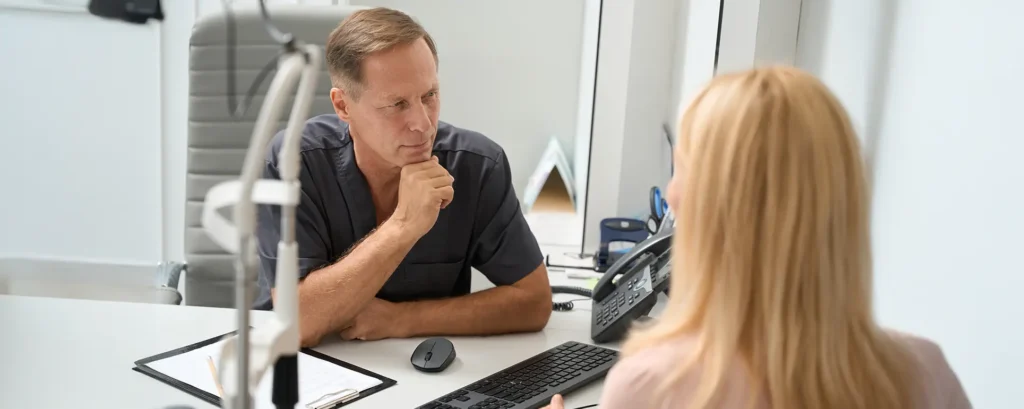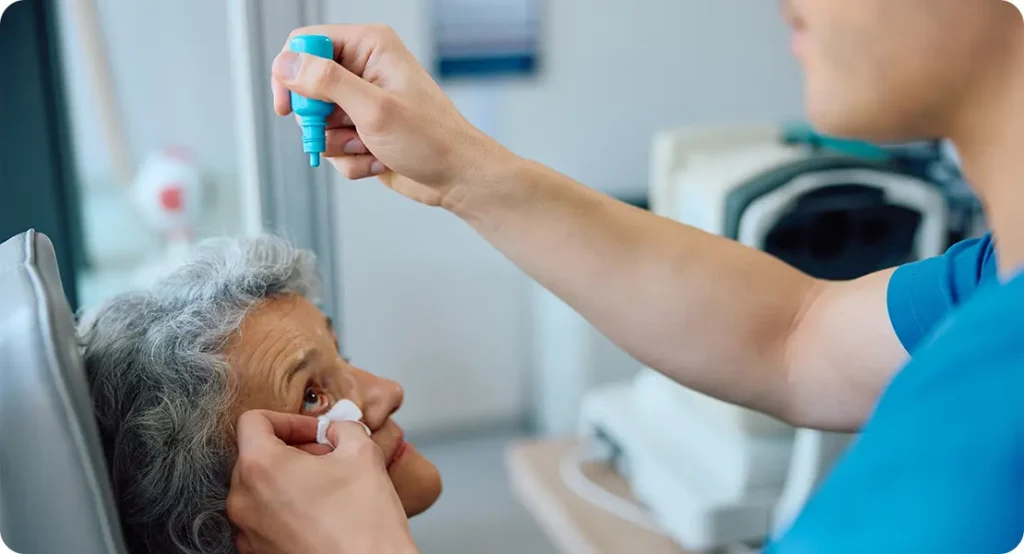If you’re still feeling the effects of Long COVID and have been told you need cataract surgery, you might be wondering—will my lingering fatigue or inflammation make things riskier? Can I still have surgery safely? Should I delay it? These are all valid concerns, especially if your recovery hasn’t followed a straight path. In this guide, we’ll walk you through exactly how cataract surgery is approached in people living with Long COVID. From fatigue management and inflammatory markers to anaesthetic choices and aftercare, we’ll break it all down in plain language so you know what to expect.
What Is Long COVID?
Let’s start with a quick recap. Long COVID (or post-COVID syndrome) refers to symptoms that continue for weeks or even months after the initial SARS-CoV-2 infection has cleared. You might feel extreme fatigue, brain fog, joint pain, shortness of breath, or ongoing inflammation. It’s not all in your head—research shows that even mild COVID infections can leave behind long-lasting effects on the immune system, vascular system, and even the nervous system.
For people needing surgery, including something as routine as cataract surgery, this means we need to look at your body’s current state—not just whether you’ve “recovered” on paper. Your energy levels, inflammatory status, cardiovascular fitness, and even psychological readiness all matter.
Should You Delay Cataract Surgery if You Have Long COVID?
This is the first thing many patients ask—and rightly so. The short answer is: not always. If your vision is severely impacted by cataracts and your Long COVID symptoms are relatively stable, it’s usually safer to go ahead with surgery rather than delay it indefinitely.
However, your surgical team will look at a few things closely:
- Fatigue severity: If you’re bedbound or unable to manage basic daily tasks, that’s a sign to wait a bit longer.
- Post-exertional malaise: If activity leads to a “crash,” even minor surgery might prolong recovery.
- Autonomic symptoms: If you’re experiencing irregular heart rate, dizziness, or temperature regulation issues, these need extra attention.
- Breathing issues: For those with ongoing shortness of breath or reduced lung function, anaesthetic choices need careful planning.
Each case is individual. That’s why the pre-operative assessment for Long COVID patients is more detailed than usual.
Fatigue and Energy Pacing Around the Surgery

Fatigue is the number one complaint for people with Long COVID. Unlike normal tiredness, this type of fatigue doesn’t always respond to rest and can worsen after minor stress or exertion. So when it comes to cataract surgery, planning is key.
Your team may:
- Schedule surgery earlier in the day, when your energy is more likely to be stable.
- Avoid back-to-back appointments, so you’re not worn out by the time surgery comes.
- Use short-acting sedatives or skip sedation altogether if you’re prone to grogginess.
- Keep you lying flat for less time, reducing postural fatigue.
- Provide quiet recovery areas, especially if sound and light sensitivity are issues for you.
Even though the surgery itself is quick (usually 10–15 minutes), the whole experience can take a toll. Communicate clearly about your limits—this will help your team tailor care.
Managing Inflammation and Immune Overactivation
Long COVID isn’t just about feeling tired. Many people with it have ongoing low-grade inflammation—especially in blood vessels, muscles, joints, and sometimes the brain. This means surgery might trigger a larger inflammatory response than expected, even though the eye procedure is minimally invasive.
Here’s how it’s usually handled:
- Blood tests may be done to check for C-reactive protein (CRP) or other markers of inflammation.
- Pre-emptive anti-inflammatory treatment, like topical NSAID drops, may be started earlier than usual.
- Monitoring after surgery is extended, especially for signs of rebound inflammation or pain sensitivity.
- Corticosteroids might be used in the days following surgery, but only when benefits outweigh risks—especially in patients prone to immune dysfunction.
Your ophthalmologist might also liaise with your GP or Long COVID clinic to make sure systemic inflammation is being tracked in the background.
Anaesthetic Considerations in Long COVID Patients

Anaesthesia can be a tricky subject if you’re still dealing with Long COVID symptoms. Some people report heightened sensitivity to medication, delayed metabolism, or difficulty recovering from even mild sedation. That’s why many clinics now offer anaesthetic plans specifically designed for post-COVID patients.
Key strategies include:
- Topical anaesthesia only: In many cases, numbing eye drops are all that’s needed—no needles, no sedation.
- Avoiding general anaesthesia: Unless absolutely necessary, general anaesthesia is not used for cataract surgery, especially in people with Long COVID-related respiratory or heart issues.
- Ultra-light sedation, such as minimal-dose midazolam, can be offered for anxiety—but this is decided carefully based on your history.
- Local anaesthetic blocks (like sub-Tenon’s anaesthesia) might be used if drops alone aren’t enough, but only if they’re unlikely to cause systemic side effects.
If you’ve ever had unusual reactions to anaesthetic in the past, or a tough recovery after previous surgery, bring it up during your pre-op assessment.
Heart Rate, Blood Pressure, and Autonomic Symptoms
Many Long COVID patients report dysautonomia—basically, a dysfunction in the part of the nervous system that controls automatic functions like heart rate and blood pressure. During cataract surgery, it’s crucial that your cardiovascular status is stable, especially because the experience itself (lights, stress, lying flat) can cause fluctuations.
So your surgical team will often:
- Monitor vitals more closely, sometimes before and after the actual procedure.
- Avoid medications that can spike or crash your blood pressure unexpectedly.
- Keep intravenous fluids ready in case hydration becomes an issue.
- Adjust your position during surgery if lying flat worsens symptoms like dizziness or nausea.
In some cases, a pre-operative referral to a cardiologist might be suggested if there are concerns about postural orthostatic tachycardia syndrome (POTS) or other conditions.
Brain Fog and Consent Process
Brain fog isn’t just annoying—it can affect your ability to fully understand medical information, weigh risks, and make decisions. For any surgery, informed consent is a legal and ethical requirement. But if your thinking is fuzzy due to Long COVID, the process may need a little more time and support.
Here’s what often helps:
- Information in writing, so you can go over it at your own pace before the day of surgery.
- Extra consultation time, so you can ask questions and feel clear about your options.
- Having a family member or friend with you, if you’d like someone to help process the details.
Don’t be afraid to say, “I need this explained again.” Your surgeon would rather take the time than have you feel unsure later.
Recovery Timeline: What to Expect After Surgery
Cataract surgery usually has a fast recovery—most people feel back to normal in a day or two. But with Long COVID, healing might take a little longer. That doesn’t mean there’s a complication—it just means your system needs more time to bounce back.
You might experience:
- Extended tiredness for a few days.
- Sensitivity to light more than expected.
- Dry or gritty eyes that linger.
- Mood dips or irritability as your nervous system recalibrates.
Be gentle with yourself. Let your surgeon know if anything seems “off,” even if it’s not strictly eye-related. Often it’s just your nervous system responding to the stress of surgery.
Coordinated Care with Your Long COVID Team
One of the biggest challenges in managing cataract surgery with Long COVID is communication. Ideally, your GP, ophthalmologist, and any specialists you’re seeing (like a Long COVID clinic) should all be on the same page.
Some tips:
- Share all your medications, supplements, and any alternative treatments you’re using.
- Let your cataract surgeon know about any other investigations or therapies ongoing.
- Ask for a discharge summary, so your GP can update your records and track recovery.
- Consider follow-up calls, especially if your symptoms fluctuate or you need reassurance.
With the right coordination, cataract surgery can be safe and successful—even if your health is still in flux.
FAQ: Cataract Surgery and Long COVID
- Is cataract surgery safe if I still have Long COVID symptoms?
Yes, it can still be safe as long as your symptoms are stable and not severely limiting your function. Your surgeon will assess your overall condition—including fatigue levels, breathing status, and medication sensitivity—to create a plan that minimises risks and supports recovery. - Will Long COVID affect how I recover from cataract surgery?
Possibly. While the eye itself often heals within days, people with Long COVID may find their body takes longer to bounce back overall. You might feel more drained, mentally foggy, or sensitive to light and stress than someone without ongoing post-viral symptoms. - Will I need general anaesthetic if I have Long COVID?
Almost never. Cataract surgery is usually performed using numbing eye drops (topical anaesthetic), and that’s particularly ideal for Long COVID patients. General anaesthetic is avoided unless absolutely necessary due to potential respiratory and recovery issues. - What if I have brain fog and struggle to understand medical information?
That’s common, and your medical team will take it into account. You can ask for written information in advance, have a family member attend consultations, and take your time processing details so you can give informed consent without pressure. - Do I need to stop my Long COVID medications before surgery?
Don’t stop anything without medical advice. Many Long COVID patients are on supplements, low-dose steroids, or other therapies—your surgical team needs a full list so they can plan safely, but stopping abruptly could cause more harm than good. - Can surgery trigger a Long COVID flare-up or crash?
In some cases, yes—especially if you’re prone to post-exertional malaise. The procedure itself is short, but the stress on the nervous system can be enough to trigger fatigue or immune flare. Planning plenty of rest before and after surgery can reduce this risk. - Should I wait until I fully recover from Long COVID before having cataract surgery?
It depends. If your vision is deteriorating significantly or impacting daily life, waiting might not be ideal. However, if your Long COVID symptoms are severe or unpredictable, your doctor may recommend postponing surgery until you’re more stable. - I’m sensitive to light and noise—will that be a problem during surgery?
Not if your team knows in advance. They can lower surgical lights, keep conversation minimal, and reduce sensory stress wherever possible. These small adjustments can make a big difference to your comfort on the day. - What if I feel too exhausted to attend multiple appointments?
Let the clinic know—many centres will consolidate appointments or offer phone or video consultations where appropriate. You may also be able to book your surgery early in the day to suit your energy rhythms. - Can someone accompany me to help with mobility and communication?
Yes, and in fact it’s encouraged for patients with fatigue or brain fog. Having someone with you can ease anxiety, help absorb information, and support your journey home after the procedure.
Final Thoughts
Having cataracts when you’re still dealing with Long COVID adds a layer of complexity—but it doesn’t mean surgery is off the table. What it does mean is that your care needs to be more personalised. From anaesthetic planning and inflammation management to consent and pacing your energy, each step can be adapted to suit your current condition. If you’re feeling unsure, ask as many questions as you need. The more your surgical team knows about your Long COVID experience, the better they can tailor your care.
For more expert-led guidance on cataract surgery, visit the London Cataract Centre — we’re here to help you navigate it all with confidence.
References
- Boles, S. & Ashok, S.R. (2023) Pre-assessment and management of long COVID patients requiring elective surgery: challenges and guidance in Perioperative Medicine, 12, Article 20. This UK‑based guidance highlights increased postoperative risks, prolonged inflammation, and the need for multidisciplinary preoperative assessment for Long COVID patients. Available at: https://perioperativemedicinejournal.biomedcentral.com/articles/10.1186/s13741-023-00305-3 (Accessed: 4 August 2025)
- Bajraktari, G. et al. (2023) Early and late complications after cataract surgery in uveitic eyes in Medicina (Kaunas), 59(10):1877, underlining the importance of rigorous inflammation control before and after cataract surgery. Available at: https://www.mdpi.com/1648-9144/59/10/1877 (Accessed: 4 August 2025)
- Dedania, V.S. (2022) Chronic inflammation after cataract surgery in CRSToday, offering expert insight into the management of rare postoperative inflammation such as cystoid macular edema and steroid tapering protocols. Available at: https://crstoday.com/articles/nov-dec-2022/chronic-inflammation-after-cataract-surgery (Accessed: 4 August 2025)

